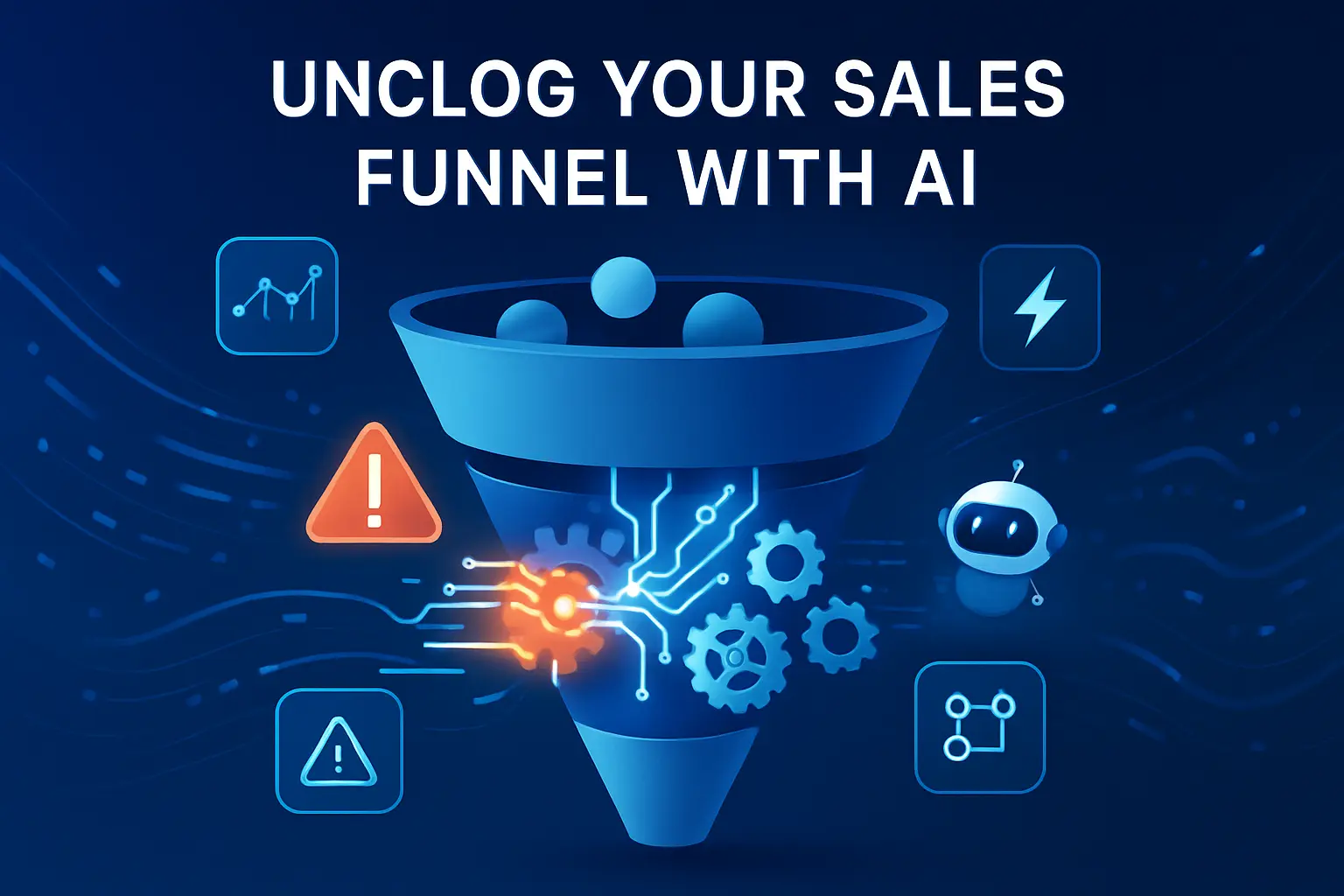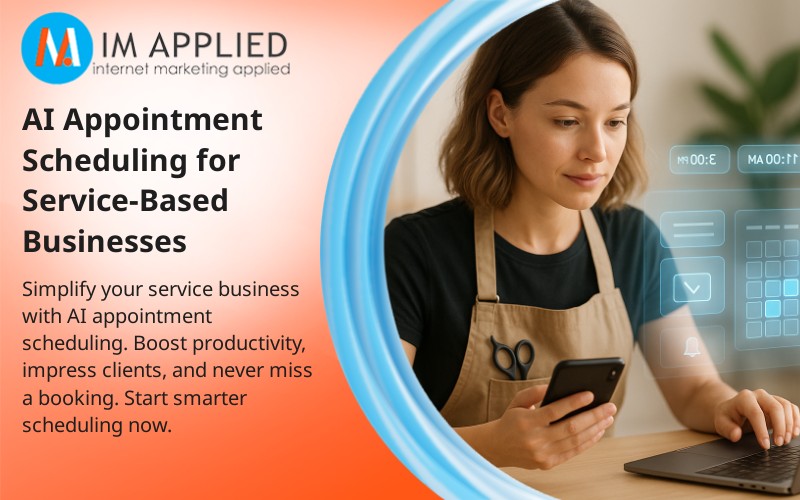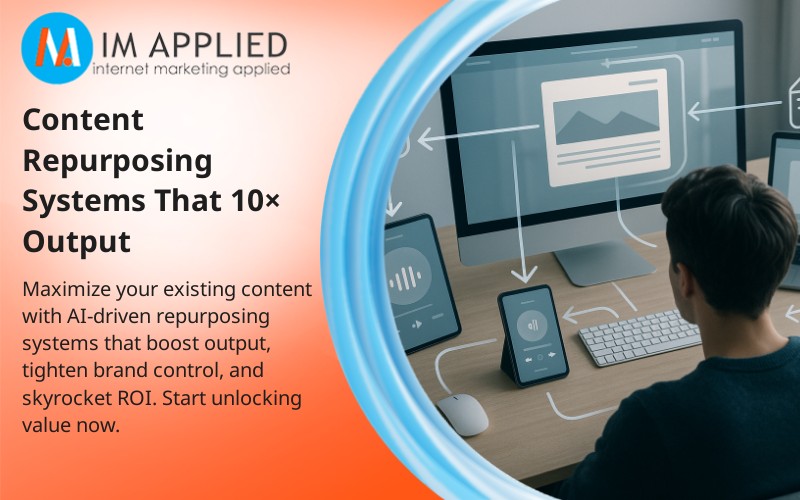How AI Can Identify and Fix Bottlenecks in Your Sales Funnel
Karl Marais | 17 July 2025
Imagine this: you’re drowning in sales data, staring at a leaky funnel, wondering where all your potential customers are vanishing.
It’s frustrating. But what if there’s a more innovative way to pinpoint those leaks and dramatically boost conversions? Thankfully, the answer isn’t more spreadsheets, it’s AI.
Let’s explore how artificial intelligence can help you not only identify but eliminate bottlenecks that are crushing your sales.
Understanding Sales Funnel Bottlenecks
Navigating a sales funnel presents unique challenges. Sales bottlenecks are the points where prospects drop off, halting their progress from lead to customer.
These can arise at any stage, from initial awareness to purchase.
A thorough sales funnel analysis identifies these roadblocks and reveals opportunities to enhance performance and boost conversion rates.
A successful funnel continuously reduces “leakage” by optimizing each stage.
Common friction points may include a clunky checkout process or an overly complicated lead form.
By proactively refining each step, you ensure prospects move smoothly from one stage to the next, maximizing efficiency and results.
Definition and Examples of Sales Bottlenecks
Bottlenecks take many forms.
Examples include issues with lead qualification (failure to filter out low-quality leads), weak nurturing efforts (ineffective follow-up), and obstacles to closing sales (poor negotiation strategies or sales pitch).
Other bottlenecks stem from process inefficiencies, such as slow response times or delays in handoffs between departments.
Identifying these patterns is crucial for implementing strategies that facilitate smoother transitions, enhance productivity, and increase deal closings.
For more information on optimizing your sales and marketing approach, refer to this guide on website optimization.
Why Identifying Bottlenecks is Critical
Pinpointing and eliminating bottlenecks is vital for revenue growth.
Addressing inefficiencies not only improves sales operations but also fosters a culture of continuous improvement.
Organizations that analyze and act on these choke points see better resource alignment, higher conversion rates, and optimized customer journeys.
Quickly resolving bottlenecks ensures that your sales process consistently delivers value and closes deals effectively, which is essential for staying competitive.
The Role of AI in Identifying Sales Funnel Bottlenecks
AI is transforming how businesses address bottlenecks. By leveraging AI, companies gain efficient, real-time analysis of vast amounts of sales data.
AI-powered sales tools highlight underperforming funnel stages by spotting patterns and diagnosing issues through advanced analytics.
These tools provide ongoing monitoring, empowering leaders to prioritize resources where they matter most.
As AI becomes mainstream, businesses that adopt it gain a significant advantage over those who don’t.
Strategies for Using AI to Fix Sales Funnel Bottlenecks

AI solutions significantly enhance conversion efficiency by pinpointing and resolving pain points in the sales funnel.
Using AI, you can streamline lead qualification, scoring, and prioritizing prospects with data-driven algorithms.
AI-driven tools facilitate smarter decision-making, break down departmental silos, and foster seamless team collaboration.
AI-powered communication provides real-time insights and shared dashboards, keeping teams aligned toward common goals and enabling workflows to adapt swiftly as bottlenecks arise.
In today’s landscape, leveraging AI is necessary for businesses aiming to thrive.
Implementing AI in Your Sales Funnel
Rolling out AI for sales begins with integrating intelligent systems that can analyze data, automate tasks, and predict customer behavior.
Select the right solutions that align with your business goals and existing processes for seamless adoption.
Gradually introduce AI tools, plan carefully, and involve stakeholders to drive buy-in and minimize disruption.
With AI-powered analytics, you’ll quickly identify where prospects drop off and make the necessary tweaks to your funnel.
This increases overall efficiency, boosts conversions, and elevates customer satisfaction as part of your digital transformation efforts.
For practical tips on leveraging AI for email marketing, explore this guide.
Steps to Start Using AI in Sales
To start leveraging AI:
- Define specific sales objectives where AI will have the most significant impact.
- Evaluate tools that align with these needs, focusing on integration with your CRM and ease of use.
- Train your sales team so they understand how to leverage AI as an augmentation, not a replacement, for human expertise.
- Monitor metrics to assess the effectiveness of AI, enabling ongoing refinements.
Following a structured roadmap ensures smooth adoption and improved performance.
Choosing the Right AI Tools
Selecting AI tools comes down to understanding your needs and comparing options based on usability, integration, scalability, and vendor support.
Read reviews, pilot key features, and ensure strong customer support.
No tool is perfect, so pick the one that complements your workflow and adjust as your business evolves.
Common Challenges and Mistakes to Avoid
AI success relies on quality data. Insufficient or poorly structured data leads to unreliable insights. Another pitfall is inadequate training.
Teams must embrace AI and understand its value, rather than fearing that it will replace them.
Set realistic expectations, AI requires time to calibrate, and results aren’t always immediate.
Transparent communication and ongoing training minimize confusion, ensuring successful integration.
Deepen your understanding with advanced AI customer conversion tips.
Case Studies: Effective AI Use in Sales Funnels

The effectiveness of AI is proven in the real world. Netflix’s AI-driven recommendation engine, for example, directly improves retention.
Salesforce uses AI for real-time customer insights and predictive analytics, streamlining the sales process.
Stitch Fix utilizes AI to personalize shopping experiences, enhancing satisfaction and driving sales.
Amazon enhances both product recommendations and inventory management, increasing efficiency throughout the funnel.
Sephora’s AI-powered assistants help customers choose products and learn new techniques, elevating engagement and loyalty.
These examples of success with AI systems demonstrate the immense value that can be achieved by customizing and continually evaluating AI deployments.
For more on using AI for customer behavior predictions, read this resource.
Future Trends in AI and Sales Funnels
The future of sales lies in AI-driven precision, from modeling customer behavior to developing adaptive, data-driven strategies that drive growth.
Leading businesses now utilize machine learning for more accurate forecasting, automated decision-making, and real-time adaptation to market shifts.
Emerging technologies, such as advanced chatbots and AI-driven personalization engines, free sales teams from repetitive tasks, allowing them to focus on relationship-building.
Early adopters gain a measurable edge as their processes become more agile and informed.
Want to see how AI balances creativity in marketing? Explore this perspective.
Sales Teams and the Rise of Human-AI Collaboration
The relationship between sales pros and AI is evolving.
AI automates data-intensive tasks, providing insights that help teams focus on high-value activities, such as building relationships and closing deals.
This synergy elevates the sales process, with technology empowering humans, not replacing them.
Sales professionals now interpret and creatively apply insights generated by AI.
Companies that foster this collaboration enjoy greater agility, higher performance, and future-proof resilience.
Ethical Considerations in AI Sales Processes
As you harness AI, ethics and privacy must remain top priorities.
Fairness, transparency, and robust data protections build trust and reduce algorithmic bias.
Stay compliant with regulations (like GDPR) and perform regular audits to mitigate risks.
Privacy & Data Security
With the increased adoption of AI comes the need for stronger data security.
Utilize encryption, maintain up-to-date privacy policies, and educate employees on responsible data handling practices.
This protects both your company and your customers, safeguarding your reputation.
Managing Algorithmic Bias
Acknowledge and address bias in AI early. Diverse teams, regular audits, and transparent processes are key.
Communicate your commitment to fairness to customers; it builds vital trust.
Conclusion: The Future of AI in Sales
AI is revolutionizing sales by streamlining processes and delivering personalized customer interactions.
By combining AI’s analytical power with human creativity, companies can scale, innovate, and differentiate like never before, positioning their business for sustainable, future-ready growth.
The AI-powered sales revolution is here; don’t let your business miss out.




